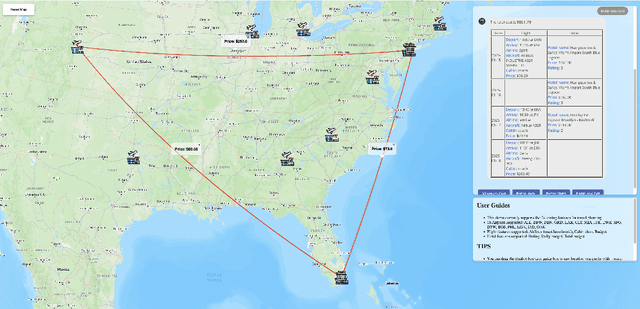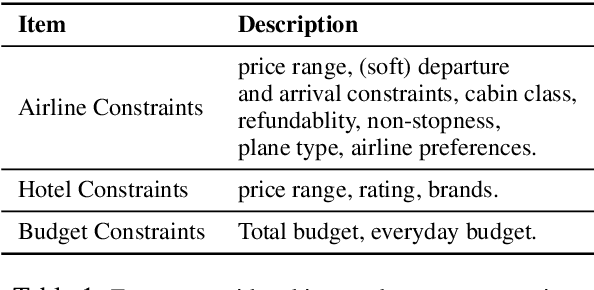Justine T Kao
What Does It Take to Be a Good AI Research Agent? Studying the Role of Ideation Diversity
Nov 19, 2025Abstract:AI research agents offer the promise to accelerate scientific progress by automating the design, implementation, and training of machine learning models. However, the field is still in its infancy, and the key factors driving the success or failure of agent trajectories are not fully understood. We examine the role that ideation diversity plays in agent performance. First, we analyse agent trajectories on MLE-bench, a well-known benchmark to evaluate AI research agents, across different models and agent scaffolds. Our analysis reveals that different models and agent scaffolds yield varying degrees of ideation diversity, and that higher-performing agents tend to have increased ideation diversity. Further, we run a controlled experiment where we modify the degree of ideation diversity, demonstrating that higher ideation diversity results in stronger performance. Finally, we strengthen our results by examining additional evaluation metrics beyond the standard medal-based scoring of MLE-bench, showing that our findings still hold across other agent performance metrics.
IntPhys 2: Benchmarking Intuitive Physics Understanding In Complex Synthetic Environments
Jun 11, 2025



Abstract:We present IntPhys 2, a video benchmark designed to evaluate the intuitive physics understanding of deep learning models. Building on the original IntPhys benchmark, IntPhys 2 focuses on four core principles related to macroscopic objects: Permanence, Immutability, Spatio-Temporal Continuity, and Solidity. These conditions are inspired by research into intuitive physical understanding emerging during early childhood. IntPhys 2 offers a comprehensive suite of tests, based on the violation of expectation framework, that challenge models to differentiate between possible and impossible events within controlled and diverse virtual environments. Alongside the benchmark, we provide performance evaluations of several state-of-the-art models. Our findings indicate that while these models demonstrate basic visual understanding, they face significant challenges in grasping intuitive physics across the four principles in complex scenes, with most models performing at chance levels (50%), in stark contrast to human performance, which achieves near-perfect accuracy. This underscores the gap between current models and human-like intuitive physics understanding, highlighting the need for advancements in model architectures and training methodologies.
Towards Full Delegation: Designing Ideal Agentic Behaviors for Travel Planning
Nov 21, 2024



Abstract:How are LLM-based agents used in the future? While many of the existing work on agents has focused on improving the performance of a specific family of objective and challenging tasks, in this work, we take a different perspective by thinking about full delegation: agents take over humans' routine decision-making processes and are trusted by humans to find solutions that fit people's personalized needs and are adaptive to ever-changing context. In order to achieve such a goal, the behavior of the agents, i.e., agentic behaviors, should be evaluated not only on their achievements (i.e., outcome evaluation), but also how they achieved that (i.e., procedure evaluation). For this, we propose APEC Agent Constitution, a list of criteria that an agent should follow for good agentic behaviors, including Accuracy, Proactivity, Efficiency and Credibility. To verify whether APEC aligns with human preferences, we develop APEC-Travel, a travel planning agent that proactively extracts hidden personalized needs via multi-round dialog with travelers. APEC-Travel is constructed purely from synthetic data generated by Llama3.1-405B-Instruct with a diverse set of travelers' persona to simulate rich distribution of dialogs. Iteratively fine-tuned to follow APEC Agent Constitution, APEC-Travel surpasses baselines by 20.7% on rule-based metrics and 9.1% on LLM-as-a-Judge scores across the constitution axes.
To the Globe (TTG): Towards Language-Driven Guaranteed Travel Planning
Oct 21, 2024



Abstract:Travel planning is a challenging and time-consuming task that aims to find an itinerary which satisfies multiple, interdependent constraints regarding flights, accommodations, attractions, and other travel arrangements. In this paper, we propose To the Globe (TTG), a real-time demo system that takes natural language requests from users, translates it to symbolic form via a fine-tuned Large Language Model, and produces optimal travel itineraries with Mixed Integer Linear Programming solvers. The overall system takes ~5 seconds to reply to the user request with guaranteed itineraries. To train TTG, we develop a synthetic data pipeline that generates user requests, flight and hotel information in symbolic form without human annotations, based on the statistics of real-world datasets, and fine-tune an LLM to translate NL user requests to their symbolic form, which is sent to the symbolic solver to compute optimal itineraries. Our NL-symbolic translation achieves ~91% exact match in a backtranslation metric (i.e., whether the estimated symbolic form of generated natural language matches the groundtruth), and its returned itineraries have a ratio of 0.979 compared to the optimal cost of the ground truth user request. When evaluated by users, TTG achieves consistently high Net Promoter Scores (NPS) of 35-40% on generated itinerary.
 Add to Chrome
Add to Chrome Add to Firefox
Add to Firefox Add to Edge
Add to Edge